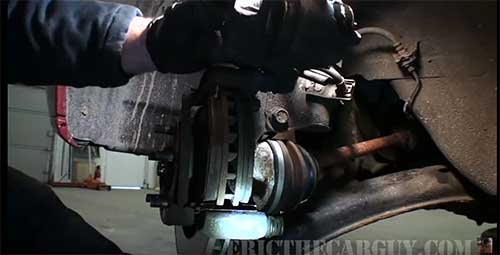What Causes Noisy Brakes?
This post is sponsored as part of my relationship with the Quality Blue Community. All opinions expressed are my own.
I think noise is the most common complaint I get about brakes. There are a few factors that contribute to this issue, but top of the list is the friction material used.
Cheap brake pads don’t often equal quiet. The same is true for ‘high mileage’ brakes. These often have metallic or hard compounds that will still stop your vehicle, but may not necessarily be quiet.
I find that the ‘silver’ or ‘premium’ brake pads work best (you can find the brake pads at Advance Auto Parts). My personal favorite friction material is ceramic. These often have a softer compound that helps eliminate noise. There is a drawback with these quieter materials, the tend to wear out faster. They may also cause a fair amount of dust that may build up on your wheels. Not to mention ceramic pads are often more expensive than their semi-metallic counterparts.
There are a few tricks you can use when installing new brake pads to help keep things quiet. Proper brake service is key to not only eliminating noise, but also for the operation of the brakes themselves.
The first thing to do is lubricate the caliper slide pins with silicone paste. Many people want to use grease or other petroleum products for this application, but experience has shown me this is not the way to go. Grease and petroleum products have a tendency to dry up when exposed to the heat caused by normal braking. They also eat away at the rubber boots used to keep dust and debris away from the slide pins. Silicone paste really is the best way to go here.
Next I lubricate the ends of the brake pads where they come into contact with the calipers themselves. This makes for smooth operation of the brakes when applied and also makes it easier for them to release when not applied.
Another thing to be considered is the surface of the rotors. Over time the surface of these components gets embedded with some of the friction material from the pads. This can cause them to glaze over which can be problematic with some brake pads.
There’s a couple of schools of thought here. The first is that anytime you replace the friction material, you should also refinish or replace the rotors. The other option is to just install the new friction material onto the rotors without doing anything at all. There are a lot of manufacturers that recommend this over machining material away from the rotors.
After all, the more material there is on the rotor, the better it’s ability to dissipate heat. Since brakes turn speed into heat, any advantage you can give here is a welcome one.
I’ve done both and have had mixed results. I will say that it is perfectly acceptable to just replace the friction material. I think it’s the type of friction material you use that makes the difference when it comes to noise. Better friction material yields better results. Even if they’re noisy, the brakes will stop effectively after they’ve bedded in.
Of course the ultimate is to renew everything when you install new brakes, but that may not always be feasible depending on your financial situation. Sometimes brakes are suppose to make noise. In fact, many brake pads have a metal indicator on them designed to come into contact with the rotor to make noise when they reach their service limit.
Regardless of why your brakes are making noise, it’s always a good idea to inspect them if you do have noise when braking. If you have plenty of friction material, a brake service with the proper lubricants in the proper places may be all that’s needed. If they’re worn out, then it’s time to replace them.
Periodic brake inspections are also recommended to ensure that your brakes are wearing evenly and operating properly.
Eliminating brake noise can be challenging. Good friction material and regular brake service will go a long way toward keeping your brakes quiet and trouble free.
Be Safe, Have fun, Stay Dirty
EricTheCarGuy
Eric Cook

Video Title: What Causes Noisy Brakes? -EricTheCarGuy Video Description: I think noise is the most common complaint I get about brakes. There are a few factors that contribute to this issue, but top of the list is the friction material used.Thumbnail: http://www.ericthecarguy.com/images/blog/2016/advanced/brake-pads-and-bad-cailper-lg.jpg
 Our Address
Our Address



